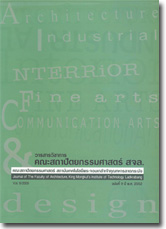“การสร้างเกมแบบจำลองเพื่อการวางแผนการจัดการขยะมูลฝอยโดยชุมชน : กรณีศึกษา โครงการเคหะชุมชนผู้มีรายได้น้อย ชุมชนแฟลตเคหะคลองจั่น เขตบางกะปิ กรุงเทพมหานคร”
Main Article Content
Abstract
บทคัดย่อ
การสร้างเกมแบบจำลองเพื่อการวางแผนการจัดการขยะมูลฝอยโดยชุมชน เป็นการสร้างเครื่องมือในการวางแผนและสร้างการรับรู้ภายใต้การเปลี่ยนแปลงทางสังคมที่มีความสลับซับซ้อนโดยเฉพาะปัญหาสิ่งแวดล้อมและสภาวะโลกร้อนที่เกิดขึ้นใกล้ตัวมนุษย์มากที่สุดในปัจจุบัน โดยมีวัตถุประสงค์หลัก 3 ประการคือ การวิเคราะห์ปัญหา สาเหตุ รูปแบบการจัดการขยะมูลฝอยในโครงการที่อยู่อาศัยแนวดิ่งของผู้มีรายได้น้อยในเขตเมือง การศึกษาแนวคิดและการสร้างแบบจำลองเพื่อการวางแผนการจัดการขยะมูลฝอยโดยชุมชน และการพัฒนาเกมแบบจำลองการจัดการขยะมูลฝอยโดยชุมชน เพื่อนำไปถ่ายทอดให้เกิดองค์ความรู้แก่เยาวชนในการแก้ไขปัญหาขยะมูลฝอยในชุมชนโครงการที่อยู่อาศัยแนวดิ่งของผู้มีรายได้น้อยในเขตเมือง จากการสำรวจพื้นที่ การสัมภาษณ์และการใช้แบบสอบถามกับกลุ่มผู้อยู่อาศัยในชุมชน และนำผลการวิเคราะห์มาสร้างเกมแบบจำลองและนำไปทดสอบในชุมชน เพื่อพัฒนาเกมแบบจำลองให้เกิดความเหมาะสมในการสร้างองค์ความรู้และความเข้าใจต่อเยาวชนในชุมชนอื่น ๆ ต่อไป
ผลการศึกษาพบว่า พฤติกรรมการจัดการขยะมูลฝอยในพื้นที่ศึกษาส่วนใหญ่จะทิ้งรวมกันในถุงใบเดียวแล้วนำไปทิ้งยังปล่องสำหรับทิ้งขยะมากถึงร้อยละ 56.7 ซึ่งเป็นเศษอาหารมากที่สุดถึงร้อยละ 42.4 และขาดการบริหารจัดการขยะมูลฝอยโดยรวมที่ดี จึงทำให้ปริมาณขยะมูลฝอยเพิ่มมากขึ้น ส่งกลิ่นเหม็น เกิดน้ำเน่าเสีย และมีขยะมูลฝอยตกค้างโดยรอบอาคาร ซึ่งส่งผลต่อคุณภาพชีวิตและทัศนียภาพของชุมชน การนำเกมแบบจำลองมาใช้ จึงเป็นการสร้างองค์ความรู้ให้ผู้เล่นเกิดความตระหนักและหันมาใส่ใจมากขึ้น โดยเริ่มจากกลุ่มเยาวชนที่สามารถนำไปปฏิบัติใช้ในชีวิตประจำวัน และสร้างรายได้ให้กับครัวเรือนได้ เช่น การแยกขยะก่อนทิ้ง การนำกลับมาใช้ใหม่ การจัดการของขายได้ ฯลฯ ตลอดจนการชี้นำให้คนในครอบครัวปฏิบัติตามได้ง่าย ส่งผลให้ปริมาณขยะมูลฝอยลดลง และนำไปสู่การจัดการแบบองค์รวมหรือการจัดการโดยชุมชนอย่างแท้จริงต่อไป
คำสำคัญ : การสร้างเกมแบบจำลองเพื่อการวางแผน , การจัดการขยะมูลฝอยโดยชุมชน , การเรียนรู้ , การจัดการบนฐานความรู้ และการจัดการแบบองค์รวม
Abstract
Urban Gaming-Simulation for Community-Based Solid Waste Management is a tool of urban planning for raising people’s awareness in complicated social change. Particularly, environmental problems and global warming crisis effects to people and community. The study aims to analyze problems, causes and solid waste housing projects of low-income community in walk up apartment, study concept and create a model of community-based solid waste management, and develop a model of community-based solid waste management for pass on knowledge of community-based solid waste management to youth people in walk up apartment. The research method comprised the document related with a field survey, interviews and questionnaires. Moreover, experiment and practice game in the community. To develop gaming-simulation for the appropriate model for creating knowledge and understanding to young people in other housing projects of low-income communities in walk up apartment.
The research found that the most people in walk up apartment have managed the waste by combining in one bag without a prior separation and release into a chimney for junk to 56.7% and more garbage is about food scraps to 42.4%. And lack of solid waste management in a community that causes more troubles, such as over solid wastes, smelly, sewage waste and rubbish left around the building. Which affect quality of life and views of community. The game-simulation is create to acknowledge of player awareness and attention turned to more of solid waste management. Start from youth groups that can lead to practical use in everyday life and generate income to households such as separation of garbage before leaving, reuse and management of sales, etc. Furthermore, the children can be able to guide acknowledge to family’s members which affect to solve solid waste problems that lead to holistic management of the real of community-based.
Key words : Urban Gaming-Simulation , Community-based Solid Waste Management , Learning , Knowledge-based Management , Historic Management
Article Details
This work is licensed under a Creative Commons Attribution-NonCommercial-ShareAlike 4.0 International License.
Copyright Transfer Statement
The copyright of this article is transferred to Journal of The Faculty of Architecture King Mongkut's Institute of Technology Ladkrabang with effect if and when the article is accepted for publication. The copyright transfer covers the exclusive right to reproduce and distribute the article, including reprints, translations, photographic reproductions, electronic form (offline, online) or any other reproductions of similar nature.
The author warrants that this contribution is original and that he/she has full power to make this grant. The author signs for and accepts responsibility for releasing this material on behalf of any and all co-authors.


